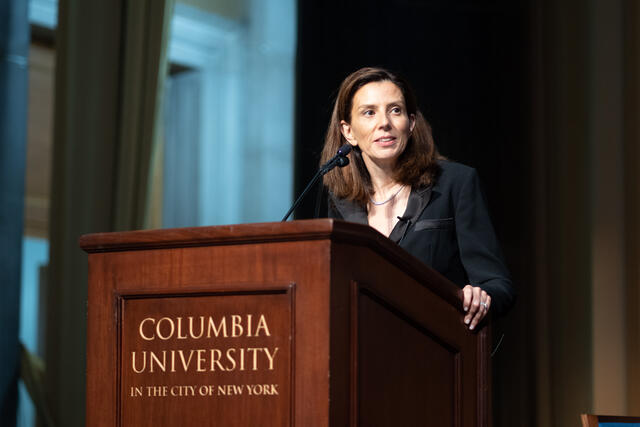
Putin’s Annexations and His War of Wills with the West
On September 30, Russia announced that it would annex territory in Ukraine’s east and south. Given this confrontational and illegal action, and some of Ukraine’s recent counteroffensives and military successes, many at SIPA thought it would be instructive to look back at the war’s evolution.

On October 12, the School convened Columbia’s top experts on Russia, Ukraine, China, and military strategy to examine the implications of Putin's annexations. Speaking to an audience of more than 230 at Low Library, and 1,000 more online, panelists discussed the prospects for an escalation of the war — including nuclear options; potential diplomatic offramps; Putin’s domestic challenges; and whether the war has influenced Chinese thinking about Taiwan.
Moderated by Dean Keren Yarhi-Milo of SIPA, the panel included Stephen Biddle, professor of international and public affairs; Richard K. Betts, Leo A. Shifrin Professor of War and Peace Studies; Elise Giuliano, a senior lecturer in political science; Kimberly Marten, a political science professor at Barnard College; Thomas J. Christensen, the James T. Shotwell Professor of International Relations; and Peter Clement, interim director of the Arnold A. Saltzman Institute of War and Peace Studies.
Watch the full panel discussion here:
Highlights
“Militaries that suffer the kinds of losses that [Russia is] suffering on an ongoing basis in an apparently futile cause for which the soldiers have little, if any, commitment have a tendency to break. The Russians have already encountered serious problems with combat motivation. If that gets bad enough, you could trip over a cliff and the Russian military could refuse to fight.”
– Stephen Biddle
“While I favor giving the Ukrainians as much useful military aid as possible, it should be strictly conditional with a clear stipulation that you get this as long as you meet American demands such as maintaining the sort of Russian sanctuaries within Russian territory, not carrying the war into Russian territory… things that, for the Ukrainians, might be hard to accept because of knowledge about what advantages they could get if they had more freedom.”
– Richard K. Betts
“We keep using this term ‘pro-Russian,’ but we don’t interrogate what it means ... It’s critical to understand this fact that Russian-speaking Ukrainians are not pro-Russian and language doesn‘t determine political sympathies in Ukraine.”
– Elise Guiliano
“I could imagine that if Putin decided to use a nuclear weapon and the result was that Russia was so incredibly isolated on the international stage that nobody wanted to be its friend, its economy at that point would probably just about collapse. At that point, people might decide that it was time that they had to do something.”
– Kimberly Marten
“I think that at the most basic level, Putin exploited his relationship with Xi Jinping by having a very public statement about the limitless nature of the partnership between the [People’s Republic of China] and Russia, and then three weeks later launching a war that really runs against Beijing’s interests.”
– Thomas J. Christensen
“I think Putin basically told us what he thought about Ukraine and it should not have been too much of a surprise that he actually acted on it.”
– Peter Clement